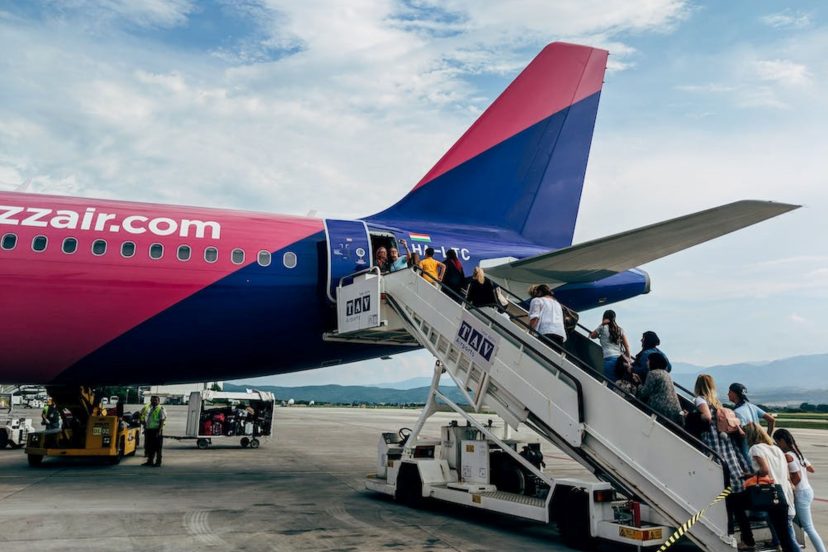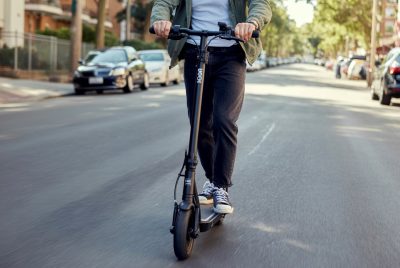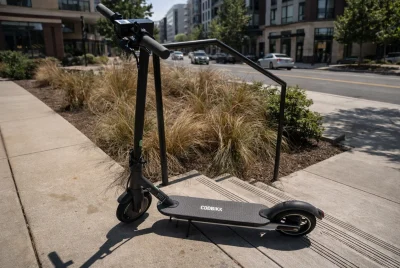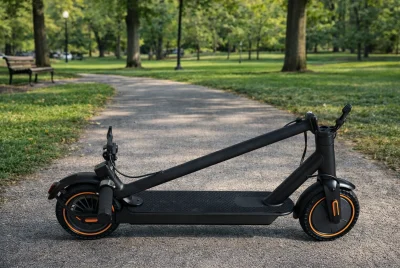Can I Take My Electric Scooter On A Plane?
*We may earn a commission for purchases made using our links. Please see our disclosure to learn more.
Are you wondering if you can take your electric scooter on a plane? You’re not alone! Many travelers love their scooters for zipping around new cities, but when it comes to air travel, things can get tricky.
Different airlines have different rules, and the batteries in electric scooters might be a concern.
One key point before we dive in: lithium-ion batteries power most electric scooters and these are subject to strict regulations on planes. This article will guide you through what you need to know about those pesky airline policies and how they apply to your trusty two-wheeled friend.
We’ll check out rules for major US and Canadian airlines, give tips on other transportation options, and help clear up confusion so you can plan your trip with ease. Keep reading – there’s plenty of helpful info ahead!
Bring Your Electric Scooter on a Plane: What You Need to Know
Before you bring your electric scooter on a plane, it’s important to understand the airline regulations for transporting such items. This includes knowing whether it can be brought as carry-on or checked luggage and any restrictions on batteries and types of scooters allowed.
Airline regulations for transporting electric scooters
Traveling with electric scooters can be tricky due to airline regulations. Most airlines treat electric scooters as battery-powered mobility devices, and these can come with strict rules.
For instance, you must remove the lithium ion batteries from your scooter before boarding. Airlines have specific watt-hour limits for these batteries, typically capping at 160 watt-hours.
If your scooter has a larger battery, you might need special approval or it may not be allowed on board at all.
Packing an electric scooter for air travel requires careful planning. First off, consult your chosen airline’s policy; some may allow small foldable scooters as checked luggage but will likely apply extra charges for their transportation.
Mobility scooters like the SmartScoot™ comply with FAA guidelines and tend to receive more leniency since they are essential for individual mobility.
Always call ahead or check the airline’s website for their particular guidelines on carrying electric scooters on a plane. Certain carriers might provide clear instructions or even list approved models that align with aviation regulations.
This ensures you don’t face unexpected surprises at the airport when traveling with personal electric vehicles.
Carry-on vs. checked luggage
When traveling with an electric scooter, it’s essential to understand the regulations for carrying it on board as carry-on or checking it as checked luggage. Most recreational scooters are prohibited from both carry-on and checked baggage, so travelers should carefully review the specific airline policies regarding electric scooters.
While some airlines may allow certain types of electric scooters as part of carry-on luggage, others may require them to be checked in due to safety concerns.
It’s crucial to note that virtually no airline will permit passengers to check an electric scooter with a battery exceeding 160 watt-hours capacity. Additionally, there might be extra charges associated with bringing an electric scooter on board a flight.
Restrictions on batteries and types of scooters allowed
Batteries with more than 160 watt-hours capacity are generally not allowed on planes. Most airlines prohibit scooters with these battery types from both carry-on and checked luggage due to safety concerns.
It’s important to note that specific regulations may vary by airline, so it’s essential to check the policies of the airline you plan to travel with regarding the types of batteries allowed for electric scooters.
Additionally, certain types of scooters may be restricted for air travel, especially if they do not comply with airline-approved specifications. Always ensure your scooter meets the requirements set forth by your chosen airline before making any travel arrangements involving air transportation.
Airline Policies for Popular US Airlines
Delta, United, Southwest, JetBlue, and American Airlines all have specific regulations and guidelines for bringing electric scooters on their flights. It’s important to check with each airline individually to ensure that you are following their policies before traveling with your electric scooter.
Delta, United, Southwest, JetBlue, American
When it comes to taking your electric scooter on a plane, it’s crucial to be aware of the specific policies set by the airline you’re flying with. In the United States, major airlines have individual guidelines regarding the transportation of electric scooters. Let’s summarize what each of the popular US airlines – Delta, United, Southwest, JetBlue, and American – state about their electric scooter policies in a clear and concise manner.
| Airline | Policy Overview |
|---|---|
| Delta |
Accepts electric scooters as checked luggage with battery capacity restrictions. Approval required for batteries over 160 watt-hours. |
| United |
Allows electric mobility scooters with prior notice and adherence to battery regulations. Non-mobility scooters may face restrictions. |
| Southwest |
Permits airline-approved electric scooters for mobility purposes. Requires customers to follow battery safety guidelines. |
| JetBlue |
Accepts electric mobility scooters in compliance with FAA regulations. Specific instructions provided for the safe transport of batteries. |
| American |
Requires customers to follow battery restrictions for electric mobility scooters. Recreational scooters subject to different conditions. |
For those planning to fly with an electric scooter, always check with the airline ahead of time to ensure you understand their specific requirements and any potential extra charges. This can save you time and hassle at the airport. Remember, safety regulations, particularly regarding battery wattage, are paramount and uniformly enforced to comply with aviation safety standards.
Canadian Airlines’ Policies
Air Canada, WestJet, Porter, Flair, and Air Transat all have their own specific policies when it comes to traveling with electric scooters. It’s important to familiarize yourself with these regulations before heading to the airport.
Air Canada, WestJet, Porter, Flair, Air Transat
Air Canada, WestJet, Porter, Flair, and Air Transat all have specific policies for traveling with electric scooters. It is essential to review each airline’s regulations before planning your trip. When traveling with an electric scooter on Air Canada or WestJet, be aware of the restrictions on batteries and types of scooters allowed. Additionally, Porter and Flair have their own guidelines for transporting scooters as checked baggage. Remember to check the specific regulations of each airline for carrying lithium ion batteries on a plane.
When bringing an electric scooter on Air Transat, it is crucial to adhere to their policies regarding battery-powered scooters and mobility scooter regulations for air travel. As there are specific regulations for traveling with mobility scooters and electric scooters in place by these airlines, it’s important to ensure compliance before making any arrangements.
Other Modes of Transportation
Consider other modes of transportation such as trains, ferries, buses, and subways in the US and Canada for alternative ways to travel with your electric scooter. Read on to learn more about airline policies and regulations for bringing your scooter on a plane.
Trains, ferries, buses, subways in the US and Canada
Electric scooters are not just for air travel. You can also bring your electric scooter on various other modes of transportation within the US and Canada. Here’s how you can transport your electric scooter on trains, ferries, buses, and subways in both countries:
- Trains: Many train services in the US and Canada allow passengers to bring electric scooters onboard. However, it is essential to check with the specific train company for their policies and any size or weight restrictions.
- Ferries: Some ferry companies allow passengers to bring their electric scooters on board. However, it’s crucial to confirm the guidelines regarding the transportation of mobility devices beforehand.
- Buses: Certain bus operators may permit travelers to bring their electric scooters on buses, but it’s important to verify this information directly with the bus company as regulations can vary.
- Subways: In some instances, subways accommodate commuters with electric scooters; however, each transit system has its own set of rules governing this type of transportation.
Conclusion
In conclusion, it’s essential to familiarize yourself with each airline’s specific policy on bringing electric scooters on a plane. Consider the type of scooter and its battery capacity as they are crucial factors in determining whether you can travel with your electric scooter.
Remember to check for any extra charges or restrictions that may apply when bringing an electric scooter on board. Always verify with the airline beforehand to ensure a hassle-free travel experience with your electric scooter.
With proper planning and knowledge of regulations, you can confidently take your electric scooter along on your air travels.
FAQs
1. Is it allowed to bring an electric scooter on a plane?
Yes, but you must follow airline policies and adhere to lithium ion battery regulations set by airlines and TSA guidelines.
2. Do I need to get airline approval before traveling with my electric scooter?
Absolutely! Always check with the airline for air travel restrictions for electric scooters and obtain their approval first.
3. Can I carry my electric scooter in checked baggage when flying?
Electric scooters can go in checked baggage if they meet luggage restrictions, including the removal of batteries if required under airline regulations for battery-powered scooters.
4. What should I know about packing my electric scooter for air travel?
Know the guidelines for transporting electric scooters: pack it securely, remove the battery if necessary, and label any hazardous materials according to TSA guidelines.
Certain parts of your scooter could fall under prohibited items on flights due to lithium ion battery regulations or as per specific restricted items policy by airlines; always check ahead!




